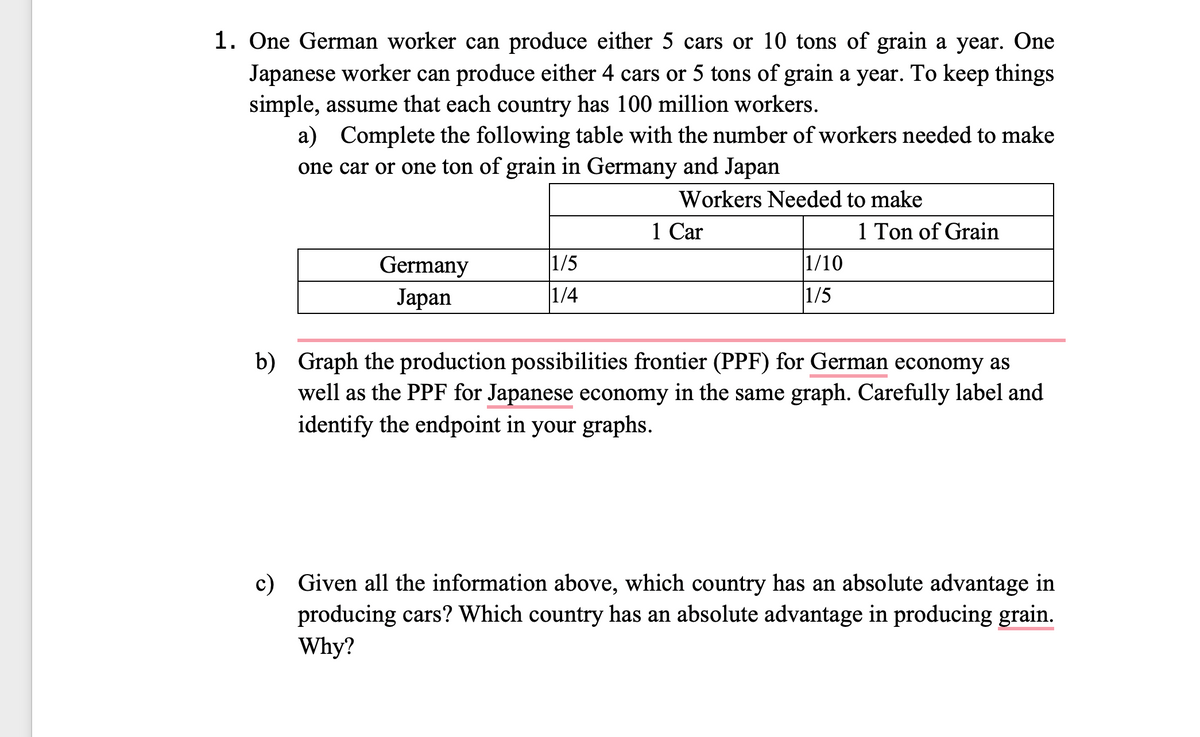1. One German worker can produce either 5 cars or 10 tons of grain a year. One Japanese worker can produce either 4 cars or 5 tons of grain a year. To keep things simple, assume that each country has 100 million workers. a) Complete the following table with the number of workers needed to make one car or one ton of grain in Germany and Japan Germany Japan 1/5 1/4 Workers Needed to make 1 Car 1/10 1/5 1 Ton of Grain b) Graph the production possibilities frontier (PPF) for German economy as well as the PPF for Japanese economy in the same graph. Carefully label and identify the endpoint in your graphs. c) Given all the information above, which country has an absolute advantage in producing cars? Which country has an absolute advantage in producing grain. Why?
1. One German worker can produce either 5 cars or 10 tons of grain a year. One Japanese worker can produce either 4 cars or 5 tons of grain a year. To keep things simple, assume that each country has 100 million workers. a) Complete the following table with the number of workers needed to make one car or one ton of grain in Germany and Japan Germany Japan 1/5 1/4 Workers Needed to make 1 Car 1/10 1/5 1 Ton of Grain b) Graph the production possibilities frontier (PPF) for German economy as well as the PPF for Japanese economy in the same graph. Carefully label and identify the endpoint in your graphs. c) Given all the information above, which country has an absolute advantage in producing cars? Which country has an absolute advantage in producing grain. Why?
Principles of Economics 2e
2nd Edition
ISBN:9781947172364
Author:Steven A. Greenlaw; David Shapiro
Publisher:Steven A. Greenlaw; David Shapiro
Chapter33: International Trade
Section: Chapter Questions
Problem 7SCQ: If the removal of trade banters is so beneficial to international economic growth, why would a...
Related questions
Question

Transcribed Image Text:1. One German worker can produce either 5 cars or 10 tons of grain a year. One
Japanese worker can produce either 4 cars or 5 tons of grain a year. To keep things
simple, assume that each country has 100 million workers.
a) Complete the following table with the number of workers needed to make
one car or one ton of grain in Germany and Japan
Workers Needed to make
1 Car
Germany
Japan
1/5
1/4
1/10
1/5
1 Ton of Grain
b) Graph the production possibilities frontier (PPF) for German economy as
well as the PPF for Japanese economy in the same graph. Carefully label and
identify the endpoint in your graphs.
c) Given all the information above, which country has an absolute advantage in
producing cars? Which country has an absolute advantage in producing grain.
Why?
Expert Solution
This question has been solved!
Explore an expertly crafted, step-by-step solution for a thorough understanding of key concepts.
Step by step
Solved in 5 steps with 1 images

Knowledge Booster
Learn more about
Need a deep-dive on the concept behind this application? Look no further. Learn more about this topic, economics and related others by exploring similar questions and additional content below.Recommended textbooks for you

Principles of Economics 2e
Economics
ISBN:
9781947172364
Author:
Steven A. Greenlaw; David Shapiro
Publisher:
OpenStax

Principles of Economics 2e
Economics
ISBN:
9781947172364
Author:
Steven A. Greenlaw; David Shapiro
Publisher:
OpenStax